Share
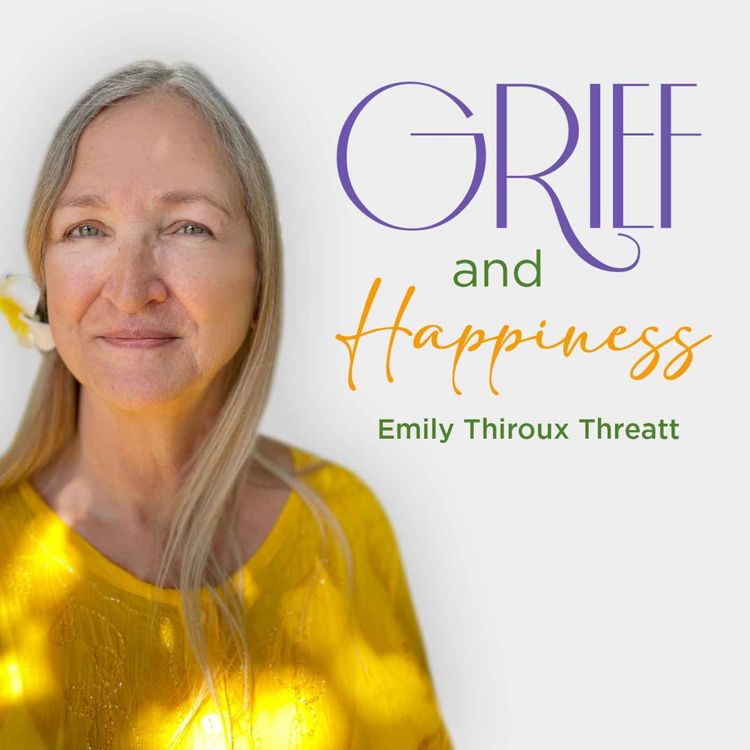
Grief & Happiness
They Couldn’t Speak Through Grief—So These Authors Wrote Their Way Back to Life
When grief left them speechless, award-winning authors Julia Park Tracey and Christine Walker turned to fiction—not just to cope, but to give their sons a voice that would live on forever.
In today's episode, I'm joined by Julia Park Tracey and Christine Walker—two accomplished creatives who have transformed personal grief into meaningful art. Julia is an award-winning author, journalist, and publisher at Sibylline Press. Her historical novels The Bereaved and Silence are inspired by ancestral stories and deeply shaped by the loss of her stepson. Christine is a visual artist, designer, and writer whose novel Tap Dancing at the Bluebird, drawn from her grandmother’s Depression-era diaries, was reimagined through the lens of losing her son, Quinn. Both women use their work to explore themes of loss, healing, and transformation.
Throughout this episode, Julia and Christine share how their sons’ deaths profoundly influenced their creative processes. Julia describes how grief deepened the emotional truth of her characters and led her to speak openly about loss, both in life and on the page. Christine talks about infusing her novel’s character with Quinn’s essence—his “quinescence”—to give him a lasting literary presence, and how painting helped her process pain when words failed. Together, they reflect on the healing power of storytelling and the ways creativity can offer connection, comfort, and a sense of continuity through grief.
Tune in to episode 328 as Julia Park Tracey and Christine Walker share how channeling their grief into writing and art helped them honor their sons, process profound loss, and discover a lasting sense of connection, creativity, and healing.
In This Episode, You Will Learn:
Julia’s story: Writing through historical grief and personal loss (1:14)
Christine’s journey: From garden journals to literary healing (6:12)
Giving their sons a literary afterlife (9:40)
How grief alters language and social norms (14:17)
To tell or not to tell: Sharing a child’s death publicly (17:24)
Redefining happiness: Can we ever feel joy again? (23:39)
Writing fiction as a healing tool for grievers (28:22)
When grief silences you: Finding voice through action (31:45)
Connect with Julia Park Tracey:
Get Julia’s books!
Connect with Christine Walker:
Get Christine’s books!
Let's Connect:
More episodes
View all episodes
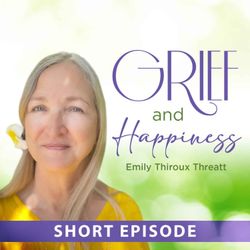
405. Who is Your Ohana?
04:30||Ep. 405Let's Connect:You can join the Grief and Happiness Alliance which meets weekly on Sundays by clicking hereYou can order the International Best Selling The Grief and Happiness Guide by clicking here.You can order Loving and Living Your Way Through Grief by clicking here at Amazon:You can listen to my podcast, Grief and Happiness, by clicking hereRequest your Awaken Your Happiness Journaling Guide hereSee acast.com/privacy for privacy and opt-out information.
404. Wholeness Is Your Birthright, Says Author Harper A. Bailey: Stop Searching for What You Already Have
41:20||Ep. 404If you've ever felt broken by grief or wondered if healing is truly possible, episode 404 of Grief and Happiness is for you. Author Harper A. Bailey shares the two words a hospice nurse whispered at her mother's bedside—"no regrets"—that took nine years in "the wilderness" of grief to understand. Through her lifelong journaling practice, Harper reveals why wholeness isn't something you search for—it's your birthright, waiting to be reclaimed. Her message will shift how you see grief, forgiveness, and healing.In This Episode, You Will Learn:(01:15) Harper's mission as a storyteller and her journey to wholeness(02:36) The four parts of her story: running, falling, sinking, and flying(03:30) Nine years in "the wilderness" after her mother's death(07:07) Accessible journaling methods: voice notes, junk journaling, and more(09:04) Why healing in community matters—isolation versus connection(12:52) How storytelling gives others permission to come home to themselves(16:31) Metabolizing grief: why you have to work through it, not around it(22:12) The boulder we carry: releasing trauma through writing(25:28) Forgiveness misconceptions—it's not letting others off the hook(27:41) "No regrets": the hospice nurse's message that changed everything(30:56) The power of 52 weekly cards: writing as an act of love(38:04) Small acts of kindness create ripple effects in grief(39:08) Why smiling and grief can—and should—coexistHarper A. Bailey is a Chicago native, public health leader, storyteller, and debut author whose raw and inspiring memoir It Was Her (October 2024) chronicles her journey through grief following her mother's death 13 years ago. A lifelong journalist since age nine who still keeps all her journals, Harper's work bridges personal transformation with public health as she helps people reclaim their wholeness. Her book unfolds in four parts—running, falling, sinking, and flying—revealing how she navigated nine years in "the wilderness" of grief before discovering the transformative power of journaling, forgiveness, and healing in community.In this episode, Harper shares her powerful message that grief comes in many forms—from loss of loved ones to job disappointments and "micro griefs"—and that metabolizing grief through confrontation rather than avoidance is essential to experiencing the present. She advocates for accessible journaling methods including traditional writing, voice notes, and junk journaling, emphasizing that this practice helps move what's inside out and creates space for healing. Central to her philosophy is the belief that wholeness is our birthright: we're not broken, but rather need to reclaim what already belongs to us through storytelling, forgiveness of self and others, and authentic connection in community. Harper reminds us that while we can't always choose our experiences, we can take control today and come home to ourselves.Connect with Harper A. Bailey:WebsiteFacebookInstagramBook: Harper A. Bailey - It Was Her: A MemoirLet's Connect: WebsiteLinkedInFacebookInstagramTwitterPinterestThe Grief and Happiness AllianceBook: Emily Thiroux Threatt - Loving and Living Your Way Through Grief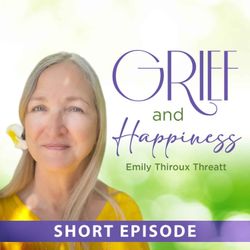
403. Writing Through Trauma
05:27||Ep. 403Writing can be the best thing you can do for self-care when you are dealing with trauma.Let's Connect:You can join the Grief and Happiness Alliance which meets weekly on Sundays by clicking hereYou can order the International Best Selling The Grief and Happiness Guide by clicking here.You can order Loving and Living Your Way Through Grief by clicking here at Amazon:You can listen to my podcast, Grief and Happiness, by clicking hereRequest your Awaken Your Happiness Journaling Guide hereSee acast.com/privacy for privacy and opt-out information.
402. Anticipatory Grief, Aftershocks, and ‘Mature Grief’: A Grief Educator Explains the Arc of Loss
33:44||Ep. 402If you’ve ever wondered what truly helps someone in grief, episode 402 of Grief and Happiness is for you. Mindset coach and certified grief educator Kathleen Quinn shares how losing her husband during COVID reshaped her view of grief as something we live with, not move past. Through moments like freezing in a grocery store parking lot and the power of saying a loved one’s name, she shows why presence matters more than words.In This Episode, You Will Learn:(00:55) How loss led Kathleen Quinn to grief education(03:46) Why grief doesn’t end—and how we live with it(04:40) Why saying the person’s name matters(06:50) Questions that help grievers feel seen(08:57) Losing a spouse during COVID and anticipatory grief(12:10) Finding purpose after profound loss(15:07) Why listening matters more than fixing(17:50) The arc of grief: anticipatory to mature(19:30) Why capable people freeze in early grief(22:16) How journaling supports healing over timeKathleen Quinn is a mindset coach, grief educator, and speaker based in Madison, Wisconsin. With more than 30 years of experience in university leadership and development, she brings deep listening skills and a grounded, compassionate approach to her work. After losing her husband during the height of the COVID pandemic, Kathleen became a certified grief educator through training with renowned grief expert David Kessler, integrating grief literacy into her coaching practice. Today, she helps individuals navigate loss, life transitions, boundaries, and self-worth with clarity, presence, and humanity.In Episode 402, Kathleen offers a thoughtful and deeply human perspective on grief, shaped by both personal loss and professional experience. She reframes grief as something we learn to live with rather than “move on” from, emphasizing the importance of presence, listening, and naming those who have died. Kathleen introduces key ideas such as grief literacy, secondary losses, and the natural arc of grief—from anticipatory grief to a stage where love outweighs pain. Through practical examples, she shows how small, intentional acts of listening and asking better questions can help grieving people feel truly seen and supported, reminding listeners that compassion often matters more than words.Connect with Kathleen Quinn:WebsiteLinkedInLet's Connect: WebsiteLinkedInFacebookInstagramTwitterPinterestThe Grief and Happiness AllianceBook: Emily Thiroux Threatt - Loving and Living Your Way Through Grief
401. Playing
03:51||Ep. 401Playing is an important component of your life at any age.Let's Connect:You can join the Grief and Happiness Alliance which meets weekly on Sundays by clicking hereYou can order the International Best Selling The Grief and Happiness Guide by clicking here.You can order Loving and Living Your Way Through Grief by clicking here at Amazon:You can listen to my podcast, Grief and Happiness, by clicking hereRequest your Awaken Your Happiness Journaling Guide hereSee acast.com/privacy for privacy and opt-out information.
400. From Dialysis Nights to Gallery Lights: How One Widow Turned Loss Into a New Creative Life
36:17||Ep. 400If you’ve ever wondered how loss can open the door to unexpected purpose, episode 400 of the Grief and Happiness podcast is for you. Artist and author Marcie Shrewsbury Lopez shares how caring for her husband through his final days—and facing the grief that followed—sparked a powerful new creative chapter. From unexpected signs on the beach to the healing pull of art and animals, Marcie shows how even deep sorrow can guide you toward meaning and renewal.In This Episode, You Will Learn:(01:07) Rebuilding life through art, friends, and horses(01:57) How horses create emotional breakthroughs in grief(03:45) The equine-therapy moment that unlocked years of tears(06:13) Why art helps access and heal deeper emotions(07:41) The dream, the meeting, and the love story that changed everything(16:06) How a 46-year age difference led to a joyful, adventurous marriage(23:00) The sacred lessons she learned while caregiving(26:06) The beach signs that continue to comfort her(27:10) How grief opened the door to her strongest creative work yetMarcie Shrewsbury Lopez is an artist, author, and storyteller whose work explores love, loss, and transformation. After the passing of her husband Adrian, she stepped more fully into her creative path, developing a body of artwork that reflects deep emotional truth. Her paintings have been featured in exhibitions across New Jersey, and her memoir shares the remarkable love story and spiritual journey that shaped her life. Marcie continues to inspire others through her art, writing, and the meaningful connections she builds around grief and healing.In this episode, Marcie reflects on the profound impact of her 20–year marriage and the ways grief opened new doors to healing. She shares how reconnecting with horses offered unexpected comfort, emotional release, and a grounding presence during mourning, and how her art became a powerful way to access and process her feelings. Marcie also recounts the extraordinary way she met and married Adrian, their life of adventure and unconditional love, and the sacred experience of caregiving at the end of his life. Her insights highlight how creativity, animals, spiritual signs, and continued bonds can gently guide us forward after loss.Connect with Marcie Shrewsbury Lopez:WebsiteBook: Marcie Shrewsbury Lopez - A PLACE OF PROMISELet's Connect: WebsiteLinkedInFacebookInstagramTwitterPinterestThe Grief and Happiness AllianceBook: Emily Thiroux Threatt - Loving and Living Your Way Through Grief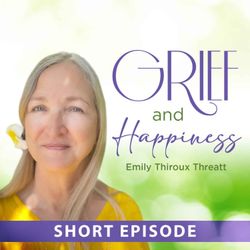
399. New Year New You
06:16||Ep. 399What one intention are you making for this year? Start it with the words: “I am.”Let's Connect:You can join the Grief and Happiness Alliance which meets weekly on Sundays by clicking hereYou can order the International Best Selling The Grief and Happiness Guide by clicking here.You can order Loving and Living Your Way Through Grief by clicking here at Amazon:You can listen to my podcast, Grief and Happiness, by clicking hereRequest your Awaken Your Happiness Journaling Guide hereSee acast.com/privacy for privacy and opt-out information.
398. From Adult Orphan to Inspired Creator: Why Saying ‘Yes’ After Grief Opens Unexpected Doors
38:52||Ep. 398If you’ve ever felt caught off guard by aging or unsure how to rebuild after loss, episode 398 of the Grief and Happiness podcast is for you. Author and artist J.J. Hubal shares the moment she “woke up old” and how that shock—combined with deep grief—pushed her to rethink her life. Through candid stories and her signature humor, she reveals how small, brave steps and saying “yes” can spark unexpected renewal. Her journey shows that your next chapter can begin at any age.In This Episode, You Will Learn:(01:22) J.J.’s journey as a writer, artist, and teacher(05:23) How deep loss in her 60s sparked Goodbye Old, Hello Bold(08:51) Why aging can feel sudden—and why honesty helps(11:32) The turning point that made her ask, “Now what?”(14:10) How saying “yes” creates new possibilities at any age(17:27) Why tiny steps matter more than big dramatic changes(21:41) How creativity and community rebuilt her confidence(24:52) The power of stepping outside your comfort zone(29:41) How keeping your “pilot light” lit fuels renewal(33:54) What happens when you keep showing up anyway(36:27) Why embracing aging unlocks untapped potentialJ.J. Hubal is a lifelong writer, artist, and former special education teacher whose work combines gentle humor, honesty, and simple, expressive illustrations. Her book Goodbye Old, Hello Bold grew from her own journey through aging and reinvention, capturing her philosophy of “I write and draw what I live.” Now retired from teaching, she devotes her time to writing and cartooning, offering relatable, uplifting guidance to anyone navigating change or seeking renewed purpose later in life.In this episode, J.J. shares candid insights on aging, grief, and rebuilding a life when everything familiar seems to fall away. She describes how accumulated loss in her 60s left her feeling directionless, and how writing and drawing became the tools that helped her move forward, one small step at a time. Her reflections highlight the power of saying yes, embracing tiny acts of courage, and recognizing new possibilities even when motivation is low. J.J.’s stories offer listeners a hopeful reminder that meaning, creativity, and connection can flourish at any age when we choose to stay open to what’s next.Connect with JJ Hubal:WebsiteFacebookInstagramYouTubeCartoonsBook: JJ Hubal - A Week at the BeachBook: JJ Hubal - Living With Your Higher PowerBook: JJ Hubal - Goodbye Old, Hello BoldLet's Connect: WebsiteLinkedInFacebookInstagramTwitterPinterestThe Grief and Happiness AllianceBook: Emily Thiroux Threatt - Loving and Living Your Way Through Grief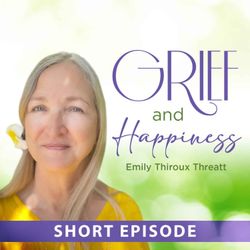
397. Christmas Presence
03:44||Ep. 397What can you do to make the holidays brighter for someone?Let's Connect:You can join the Grief and Happiness Alliance which meets weekly on Sundays by clicking hereYou can order the International Best Selling The Grief and Happiness Guide by clicking here.You can order Loving and Living Your Way Through Grief by clicking here at Amazon:You can listen to my podcast, Grief and Happiness, by clicking hereRequest your Awaken Your Happiness Journaling Guide hereSee acast.com/privacy for privacy and opt-out information.